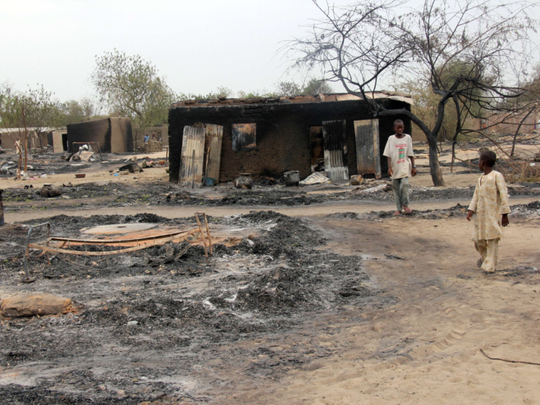
A moving, stunningly sharp editorial in the Concord Monitor in the US contextualises the violence in Nigeria like no other.
“Picture her. She is 10 years old — a beautiful, scared little girl alone and far from home. It is January 10 and she is standing in a marketplace. Waiting. For what, she’s not exactly sure,” says the editorial. “Then somebody notices the bulge around her waist. Others notice, too, and they want to see what it is, but she won’t let them. She resists just long enough.
“The explosion is unimaginably violent. At least 20 people are killed in the Maiduguri marketplace, including the little girl. She wasn’t in the wrong place at the wrong time. She was the bomb. Boko Haram’s bomb.
“This is what warfare has become.”
The Toronto Star’s editorial comes from a different space. It wonders how the world should be concerned about Boko Haram when Nigeria itself is not. “The day after the shocking assault on the offices of Charlie Hebdo in Paris, Nigerian President Goodluck Jonathan joined the chorus of world leaders condemning what he boldly labelled this ‘dastardly terrorist attack’. About the much bloodier terrorist attacks ravaging his own country at the same time, the president had much less to say. If Nigeria itself looks away, what can the rest of the world do — if it can wrench its gaze from Paris? It’s tragic that Nigeria seems to want to throw a veil of silence over the horror afflicting its own people. The rest of the world must speak up.
“It is estimated that in all of last year, Boko Haram has killed 10,000 people, making the radical terrorist group more deadly than the Ebola epidemic in West Africa.”
The Boston Globe, on the other hand, has its sympathies with the Nigerian government. Says its editorial: “World leaders must respond ... At the very least, there should be massive marches with heads-of-state in Lagos — just as in Paris after the deadly shootings at the Charlie Hebdo newspaper. Yet symbolic solidarity alone won’t suffice. Nigeria and its besieged military can’t be expected to fight Boko Haram alone ... The elections next month represent a pivotal moment for the United States to exert leverage, to convince both the Nigerians and the world that the human cost of Boko Haram’s violence is too high. We can no longer afford to stand still.”
The New York Times talks of how the world has moved on since last April. “They [the abduction of more than 200 school girls in April 2014] commanded global attention for a fleeting few days last spring. Across the world, millions prayed for and tweeted about the plight of the more than 200 Nigerian schoolgirls abducted in northeastern Nigeria by the vicious militant group Boko Haram. The US first lady, Michelle Obama, joined the cause, posting a selfie looking downcast and demanding that the militants ‘#BringBackOurGirls’. The United States government hastily put together a task force of experts and dispatched drones to search for the hostages.
“Soon, though, the world largely moved on.”
Washington and others in the international community could do more to alleviate the suffering of Nigerians in areas controlled by Boko Haram, says the New York Times, “by providing humanitarian aid and building up the capacity of the Nigerian security forces”.





_resources1_16a31069e4e_small.jpg)






